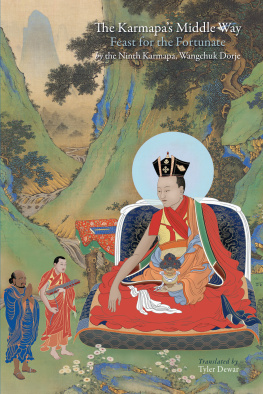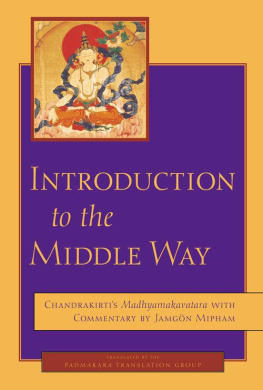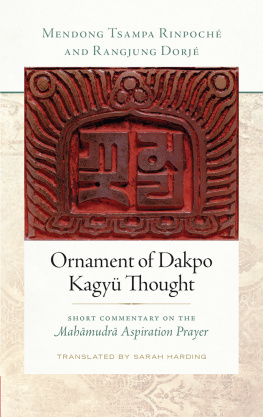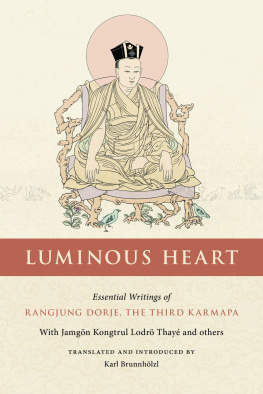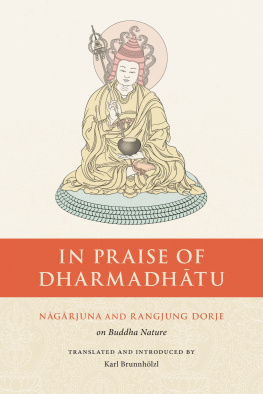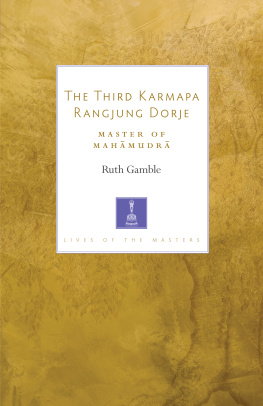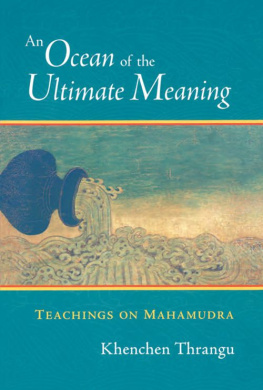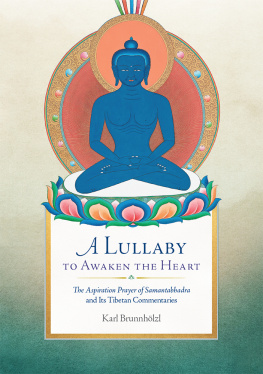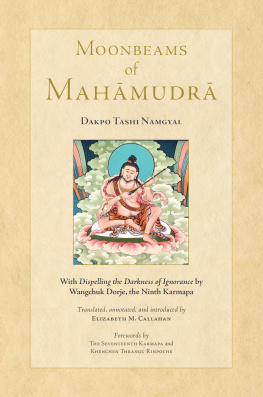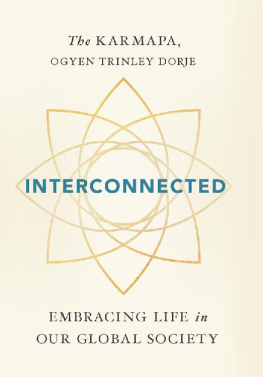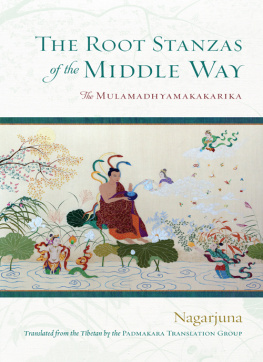Translators Acknowledgments
I T HAS BEEN a great honor to translate a key work of the Karmapa at the direction, under the guidance, and with the constant inspiration and encouragement of my guru, Dzogchen Ponlop Rinpoche. Rinpoche began teaching Chandrakrtis Entrance to the Middle Way at Nitartha Institutes annual, month-long summer sessions in 1997. He taught the entire text from start to finish between then and 2000, basing himself on the Eighth Karmapa Miky Dorjes commentary, Chariot of the Takpo Kagy Siddhas.
Returning to the Entrance to the Middle Way once more in 2004, he emphasized the difficult points of the texts general meaning and, in particular, the approach to the Consequentialist Middle Way of the early Tibetan masters and the Karmapas. During this cycle he taught from Feast for the Fortunate, the Ninth Karmapa Wangchuk Dorjes abridgement of the Eighth Karmapas text, for which I had prepared a draft translation. These teachings, which drew on the vast wealth of Rinpoches years of studies of the Middle Way and the literature of the Karmapas, provided insight into the uniqueness of the Karmapas work and much information to correct and improve my translation. Over the course of this translation project, Rinpoche patiently and kindly advised me in a way that greatly shaped the tone and content of the present work. I offer my profound gratitude and appreciation to him, along with heartfelt aspirations for his long life and for the abundant treasury of his instructions to be enjoyed by an ever-increasing number of those interested in wisdom and compassion.
I also received invaluable guidance from Acharya Lama Tenpa Gyaltsen, who selflessly granted me most of his waking hours during an intense week of discussions and reading in Boulder, Colorado in February, 2005. These sessions with Lama Tenpa brought my contemplations of the Middle Way to a deeper level and enabled me to translate some of the most difficult sections of the text with newfound confidence. My main reading mentor for this project was Acharya Tashi Wangchuk, resident teacher at Nalanda West in Seattle, Washington. Acharya Tashi gave freely of his time over the course of several months in 2003 and 2004 and once again toward the end of the project, painstakingly explaining line after line of text. He also helped research the sources of quotations and compared different editions of Entrance to the Middle Way commentaries. For the extraordinary opportunity to learn from these two great Acharyas, I am ever thankful.
Several translators influenced and informed this work. Ari Goldfield has been generous to me in sharing his translations, published (in The Moon of Wisdom, Snow Lion Publications, 2005) and unpublished, of the root verses of the Entrance to the Middle Way and portions of the Eighth Karmapas commentary. These were a primary reference for my work, as were Elizabeth Callahans draft translations of sections of Miky Dorjes text, which she produced for Ponlop Rinpoches teachings at Nitartha Institute.
I would be in a sorry state without the encyclopedic knowledge of Karl Brunnhlzl, who corrected several errors in my draft translation, righted my reading of the Karmapas chapter on the Consequentialist-Autonomist distinction, and answered all of my many questions with acuity. Cyrus Stearns kindly checked my translation of the longest section on Dolpopa Sherab Gyaltsen and gave helpful suggestions on approaching Buddhist polemics. Mark Seibold shared his intimacy with the Eighth Karmapas Chariot of the Takpo Kagy Siddhas in many helpful and stimulating conversations and gave detailed counsel on tricky passages. Scott Wellenbach, Co-Director of Nitartha Institute, and Jules Levinson offered seasoned advice at key junctures in the project. I rejoice in the opportunity to both walk in the footsteps of and learn directly from these and other senior translators.
I and readers of this book alike are indebted to Andy Karr, my editor, whose Strunk and White-like deftness, insight, and hard work led to a markedly more pleasant read. Thanks also to Jirka Hladi, who kindly researched and provided several Sanskrit terms, and to Cindy Shelton, a valued colleague whose experience in publishing and editing is continually beneficial. The Nitartha International Document Input Center (NIDIC) provided me with an edited electronic input of the Ninth Karmapas text, and also produced the edition of the Eighth Karmapas text that I consulted throughout the project. To the NIDICs editors and input staff I am truly grateful. I thank David Karma Choephel, who provided important information on Wangchuk Dorjes bibliography, and the many others who have provided feedback, encouragement, and support during this books journey into English. A special note of appreciation goes to Jeff Cox and Sidney Piburn of Snow Lion Publications for their interest and willingness to publish this text and to Steve Rhodes for his exacting work in readying the text for printing.
Even with the help of these great masters, translators, teachers, and friends, it would be difficult for any translator to produce a faultless translation of a work of this nature. All errors in the translation, or other aspects of the text, are solely my responsibility.
I am extremely grateful for the financial support of David Lunsford and the Bodhi Foundation and Eric Colombel and the Tsadra Foundation. The completion of this project would have been impossible without the vision and kindness of these two great organizations. Their generosity, patience, and encouragement throughout the course of the project were remarkable.
For organizational and community support, I would like to thank Steve Seely, Phil Stanley, and Tashi Wangmo, Co-Directors of Nitartha Institute, along with all of the Institutes administrators, faculty, and students. It is wonderful to participate in Snow Lions Nitartha Institute Series and have the opportunity, year after year, to attempt to deepen my study and contemplation of the dharma, along with my understanding of translation, at Nitartha Institute.
I would like to thank Martin Marvet, Lynne Conrad Marvet, and the staff of Nitartha international and Mark Power, Kim McMeans, and the teachers, administrators, and members of Nalandabodhi. These organizations, under the guidance of Dzogchen Ponlop Rinpoche, have not only created the conditions for my own education and work as a translator to be possible, they have helped the Buddhas genuine dharma, free of compromise, to continue its transplantation in the West and remain a vital pillar of wisdom in the East.
Finally, I would like to thank my wife, Shirley, and my daughter, Saeran, for their inspiration and support and for their patience with me throughout this projects trials and joys.
By whatever positive contribution this translation has offered, may all sentient beings realize the Middle Way, free from extremes, and may peace, harmony, and prosperity flourish in all corners of the world.
Tyler Dewar
Nalanda West
Seattle, Washington
March 31, 2007
Appendix I
EXCERPT FROM LUCID WORDS
The section of Chandrakrtis Lucid Words referred to in the Karmapas analysis of the Consequentialist-Autonomist distinction in Feast for the Fortunate
Translators note: This section of Chandrakrtis Prasannapad, or Lucid Words (ACIP TD3860, 05B-11B), is part of Chandrakrtis commentary to Ngrjunas Fundamental Wisdom, verse 1.1, which says, Not from themselves and not from others, / Not from both nor causelessly/ In things, of whatever type they may be, / Arising never exists. This entire section relates to the meaning of not from themselves. The commentary examines the issue of how to appropriately refute the Enumerators, a non-Buddhist Indian philosophical school that asserts that 1) phenomena arise from themselves, i.e., from their own essential nature, and that 2) that essential nature is present in an unclear or unmanifest way at the time of phenomenas causes. In particular, Chandrakrti compares the approaches of Buddhaplita and of Bhvaviveka regarding how the Enumerators are to be refuted by Followers of the Middle Way. He defends Buddhaplitas approach of highlighting the absurd consequences of the Enumerators position and refutes Bhvavivekas approach of using structured logic statements to affirmatively prove the nonexistence of arising from self Roman numeral section headings have been inserted by the translator and are accompanied by footnotes indicating the section

